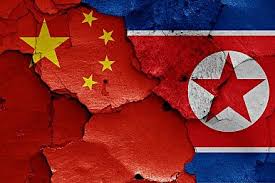
Appearing increasingly strained amidst the current crisis is the decades-long strategic relationship between Beijing and Pyongyang.
According to Kim Tae-hyo, political science professor at Seoul-based Sungkyunkwan University, a Wednesday message from North Korean leader Kim Jong Un to Chinese President Xi Jinping clearly depicts and indicates in a sure manner the declining of the warmth of the relationship between the two neighboring countries.
After Xi was chosen unanimously for a second five-year term at the 19th Party Congress of the Chinse Communist Party, the North Korean dictator wished Xi "great success," according to state media. But compared to earlier correspondence between the two leaders, the overall tone was less cordial.
Sungkyunkwan University's Kim said that phrases such as "strength of the mutual leadership, friendship and brotherhood," were part of and included in a six-sentence-long congratulatory message that was sent by Pyongyang to Xi when the latter was first appointed to the same position five years ago. This time the note made no mention of brotherhood or friendship, he continued and it was only four sentences long.
The world's second-largest economy has been increasingly clamping down on its historical ally under heavy pressure from Washington even though Beijing had been traditionally, it has been reluctant to coerce Pyongyang. In addition to halting certain exports in compliance with international sanctions, Beijing has banned domestic lenders from doing business with North Korean clients. However, during the first nine months of the year, recent figures showed that there has been a 3.7 per cent annual increase in bilateral trade.
Renmin University associate professor Cheng Xiaohe told the Carnegie-Tsinghua Center for Global Policy in a recent podcast that the Chinese are increasingly realizing that the North’s nuclear program is harming Asian security.
However, there is nothing new in tensions between Xi and Kim.
Cheng said that marked by a decline in economic ties and lack of political solidarity, the bilateral relationship has entered a period of abnormal relations ever since Kim had come to power om North Korea.
In fact, Sungkyunkwan University's Kim said that when the 33 year-old was installed as leader of the secretive state in 2011, Beijing was actually disappointed with the appointment.
He explained that a third-generation grandson governing the country of North Korea is not something that Beijing wanted to happen. He continued that instead of the supreme power currently enjoyed by Kim Jong Un, Chinese policymakers believe collective leadership would work best in the rogue state.
The isolated ruler has bene able to further consolidated political power earlier this month by promoting this younger sister to a top post and he has purged many supporters of his father Kim Jong Il.
The South Korean professor noted that interested in reaping economic concessions through international negotiations and never pointed North Korean missiles towards, Kim’s father’s style of governing and governance is different from Kim's style. no desire for diplomatic talks has however been shown by the current Kim.
(Source:www.cnbc.com)
According to Kim Tae-hyo, political science professor at Seoul-based Sungkyunkwan University, a Wednesday message from North Korean leader Kim Jong Un to Chinese President Xi Jinping clearly depicts and indicates in a sure manner the declining of the warmth of the relationship between the two neighboring countries.
After Xi was chosen unanimously for a second five-year term at the 19th Party Congress of the Chinse Communist Party, the North Korean dictator wished Xi "great success," according to state media. But compared to earlier correspondence between the two leaders, the overall tone was less cordial.
Sungkyunkwan University's Kim said that phrases such as "strength of the mutual leadership, friendship and brotherhood," were part of and included in a six-sentence-long congratulatory message that was sent by Pyongyang to Xi when the latter was first appointed to the same position five years ago. This time the note made no mention of brotherhood or friendship, he continued and it was only four sentences long.
The world's second-largest economy has been increasingly clamping down on its historical ally under heavy pressure from Washington even though Beijing had been traditionally, it has been reluctant to coerce Pyongyang. In addition to halting certain exports in compliance with international sanctions, Beijing has banned domestic lenders from doing business with North Korean clients. However, during the first nine months of the year, recent figures showed that there has been a 3.7 per cent annual increase in bilateral trade.
Renmin University associate professor Cheng Xiaohe told the Carnegie-Tsinghua Center for Global Policy in a recent podcast that the Chinese are increasingly realizing that the North’s nuclear program is harming Asian security.
However, there is nothing new in tensions between Xi and Kim.
Cheng said that marked by a decline in economic ties and lack of political solidarity, the bilateral relationship has entered a period of abnormal relations ever since Kim had come to power om North Korea.
In fact, Sungkyunkwan University's Kim said that when the 33 year-old was installed as leader of the secretive state in 2011, Beijing was actually disappointed with the appointment.
He explained that a third-generation grandson governing the country of North Korea is not something that Beijing wanted to happen. He continued that instead of the supreme power currently enjoyed by Kim Jong Un, Chinese policymakers believe collective leadership would work best in the rogue state.
The isolated ruler has bene able to further consolidated political power earlier this month by promoting this younger sister to a top post and he has purged many supporters of his father Kim Jong Il.
The South Korean professor noted that interested in reaping economic concessions through international negotiations and never pointed North Korean missiles towards, Kim’s father’s style of governing and governance is different from Kim's style. no desire for diplomatic talks has however been shown by the current Kim.
(Source:www.cnbc.com)





